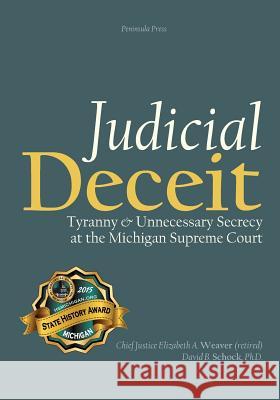Judicial Deceit: Tyranny & Unnecessary Secrecy at the Michigan Supreme Court » książka
Judicial Deceit: Tyranny & Unnecessary Secrecy at the Michigan Supreme Court
ISBN-13: 9780989410137 / Angielski / Miękka / 2016 / 770 str.
A winner of the 2015 Historical Society of Michigan Private Printing Award. Former Supreme Court Chief Justice Elizabeth Weaver, who resigned from the court in 2010 after almost 16 years of service - including two years as Chief Justice, has written a detailed plan to overhaul the election process for justices. The need for the reform is outlined in the book, Judicial Deceit: Tyranny and Unnecessary Secrecy at the Michigan Supreme Court. The book is highly critical of the "deceit, tyranny and unnecessary secrecy" of the court. "I feel a compelling duty to the people of Michigan to cast a bright light on the workings of the court, the millions in 'dark money' used for campaigns, and the partisanship that can and often does trump justice," said Weaver. "I could easily have retired to my home in Northern Michigan but I chose to spend the past two years writing the book and, most importantly, a primer called: A Seven-Point-Plan for Michigan Supreme Court Reform." "The time is now to fix the serious flaws in the election process for justices that are at the core of corrupt practices that inject dark money into the process, partisanship, and secrecy," said Weaver. "Justice should be blind but blinders should not be placed on the people of Michigan, nor should millions in campaign funds be used to buy outcomes for influential parties. We need transparency and immediate reform." Weaver says she expects the book will be controversial. Weaver, who co-wrote the book with David B. Schock, Ph.D., a writer, filmmaker, former reporter, editor and college professor. Peninsula Press publishes the 770-page book including photos and illustrations. Weaver's tenure on the court from 1994 to 2010 was stormy at times, she concedes. As an advocate for more transparency, campaign reform, and candor on the court, she clashed with her colleagues. Five of her fellow justices unsuccessfully attempted to censure Weaver, a Republican, for recording a 2006 internal discussion in which she participated by telephone. She also released a transcript in which a fellow colleague, Justice Robert Young Jr., now the court's chief justice, when he used used a racial slur while conducting the business of the court. Young is African American. Among the book's highlights: Numerous conflicts pitting the Republican majority against the Democratic minority were commonplace, including a significant case on the rules for disqualifying a justice over conflicts of interest in a given case. Weaver reports that the Republican majority pulled the entire disqualification issue from the court. And only after the chief justice was defeated in the 2008 election and replaced by a justice willing to join Weaver and two other justices did the proposed disqualification rules get put on the court's agenda and adopted over the objections of the three remaining justices who had pulled the proposals from consideration. Weaver said the majority also voted to close the file in the case so the entire subject would never be officially recorded: "It's Soviet Union (KGB) type stuff, re-writing history." Money is raised from special interest groups for judicial campaigns without putting the candidate in jeopardy for compromising judicial neutrality. Weaver describes it this way: "they don't even have to (make promises) ...you just have people raise the money for you, you can maybe sit outside the room and smile. You make statements about how conservative you are, how liberal you are - general statements as if you are going to decide on ideology as opposed to the individual facts of the case." "There is tyranny through the exercise, abuse, and misuse of the government's powers in how the cases are handled and how people and their rights are treated," Weaver says. "It is done in secrecy and it encourages the worst aspects of human behavior." More information is available on the book at www.judicialdeceit.com.











